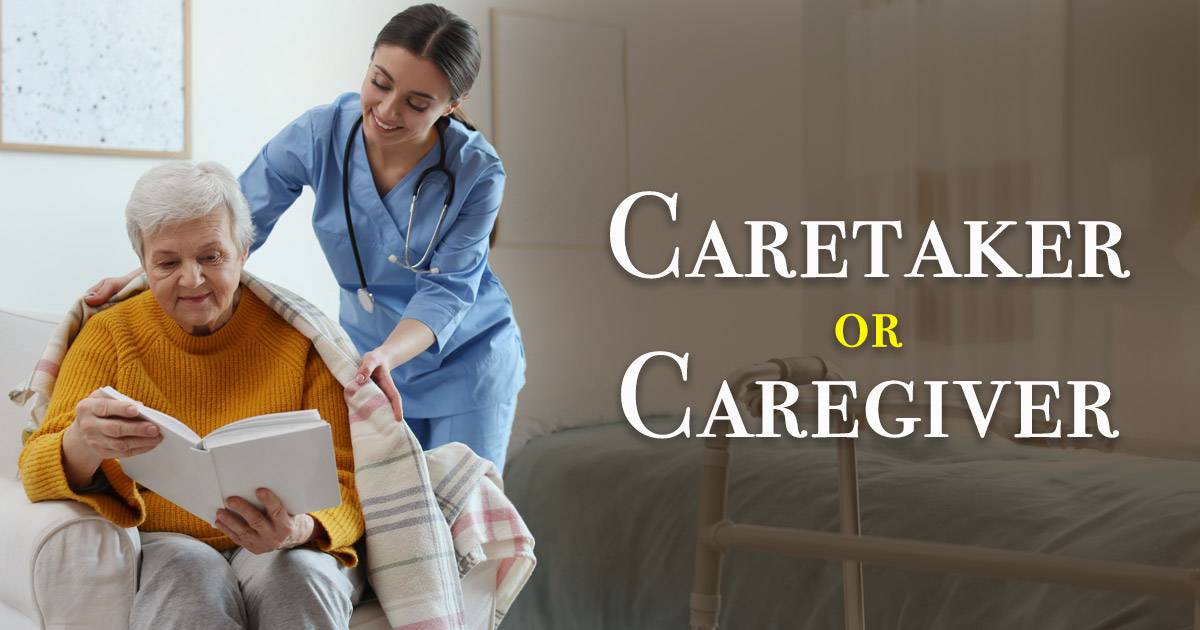Caretaker or Caregiver? Distinguishing Roles for Senior Care

Choosing someone to help care for a family member as they age is a big and personal decision. As our loved ones grow older, they might need more help than we can give, which means finding someone with the right skills to provide that support. It’s crucial to select a person who can meet both the practical and emotional needs of the elderly. Studies show that having the right support can greatly improve an elderly person’s quality of life, highlighting how important it is to make a well-informed choice.
When deciding on the best kind of care, you might come across two main roles: caretaker and caregiver. Both are essential for the well-being of older adults, but they offer different types of support. Understanding what each role involves will help you choose the best fit for your family member’s needs.
What is a Caretaker?
A caretaker is someone who looks after and takes care of a person or place. When it comes to fedelder care, a caretaker handles practical tasks like keeping the living space safe and tidy. They might do chores like cleaning, organizing, and cooking meals. Caretakers might not have medical training, but they ensure that daily needs and comforts are met.
What is a Caregiver?
A caregiver focuses on helping people who can’t fully take care of themselves due to age, illness, or disability. Caregivers assist with personal tasks like bathing, dressing, eating, and managing medications. They often have specialized training to provide both medical and emotional support, making sure the person they care for is well looked after.
Why are these roles easy to interchange?
Caretakers and caregivers sometimes get mixed up because both provide help and support. They might do similar tasks, like keeping someone company or assisting with daily activities. The main difference is their focus: caretakers handle the environment and basic needs, while caregivers provide personal and health-related care.
Caretakers and Caregivers: How They Differ
Although both caretakers and caregivers offer important help, they do different jobs and meet different needs. Here’s a simple guide to their differences:
1. Role
Caretakers are mainly about keeping things running smoothly at home. They make sure the living space is clean, safe, and tidy. Their tasks include cleaning, cooking, and organizing. They don’t usually help with personal or medical care but make sure everything is comfortable and in order.
Caregivers support people who can’t take care of themselves because of age, sickness, or disability. They help with daily activities like bathing, dressing, eating, and giving medicines. Caregivers often have special training to handle health needs and offer emotional support, taking care of the whole person.
2. Training and Skills
Caregivers usually have training in health care and first aid, so they can deal with emergencies and provide full care. Caretakers don’t need this training, as their job is more about keeping the household running smoothly.
3. Emotional Support
Caregivers are trained to give emotional and mental support, helping those they care for deal with challenges. They form close bonds with the people they help, offering companionship and ensuring they feel supported emotionally.
4. Scope of Responsibilities
Caregivers have a broader range of duties, including monitoring health and working with doctors. Caretakers focus on making the living environment nice and comfortable without getting involved in health care.
So, who takes care of the elderly?
People who look after elderly folks are usually called caregivers, especially if they handle personal care and health needs. They play a key role in helping older adults live with dignity and enjoy a good quality of life.
Choosing the Right Help: Caretaker or Caregiver?
When picking between a caretaker and a caregiver, it’s all about what kind of help is needed. Here’s a simple guide to help you decide:
Why Choose a Caretaker?
- Home Upkeep: If you need someone to keep the house tidy and safe, a caretaker is a great choice. They handle things like cleaning, cooking, and making sure everything is in order.
- Cost-Effective: Caretakers can be more affordable if you don’t need personal or medical assistance, as their main job is to manage the household.
Why Choose a Caregiver?
- Personal Assistance: If help is needed with daily tasks like bathing or eating, caregivers are better suited. They have the skills to provide this personal care.
- Health Support: For those with medical needs, caregivers can offer important health support, like giving medications and checking health conditions.
- Emotional Companionship: Caregivers also give emotional support and companionship, which is important for people who might feel lonely or sick.
Choosing the Best Care Option
When deciding between a caretaker and a caregiver, it’s important to think about a few key things. First, figure out what kind of help is needed. If keeping the house tidy and running smoothly is the main goal, a caretaker is a good choice. But if personal help with daily activities or medical support is required, a caregiver might be the better option.
Next, look at your budget. It’s crucial to know what you can afford and match that with the level of care needed. Caretakers can often be less expensive if complex care isn’t necessary.
Lastly, consider future needs. Sometimes, as situations change, someone might start with a caretaker but eventually need a caregiver. Planning ahead for these changes can make sure the support continues smoothly.
You can select the appropriate kind of assistance to guarantee your loved one receives the care they require by taking into account these variables: needs, finances, and potential changes.
